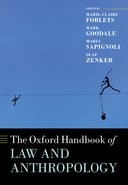Featured in The Oxford Handbook of Law and Anthropology (Oxford University Press)
This chapter examines why U.S. legal scholarship has been unable to make use of abundant empirical research on law and language within the field of anthropology. Specifically, linguistic anthropologists have disproven old theories still used by US legal philosophers to ground their analyses of legal language. These anthropologists have provided ample alternative foundations for theorizing how legal language works. After reviewing that research and contrasting outdated conceptions of legal language within legal academic scholarship, the chapter examines how metalinguistic assumptions that are built into legal thinking have actually discouraged legal theorists from incorporating more sophisticated and accurate conceptions of law’s language. While overcoming this obstacle may not be possible, the chapter concludes by urging both legal scholars and linguistic anthropologists to consider possible avenues for better communication. Updated insights from anthropological research on language and communication have much to offer legal scholars studying the language of law.

